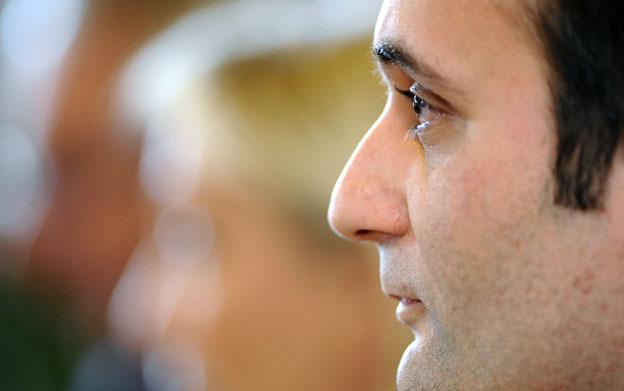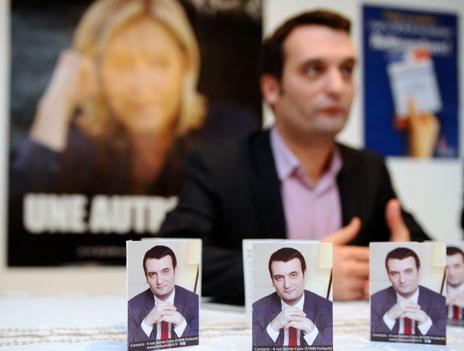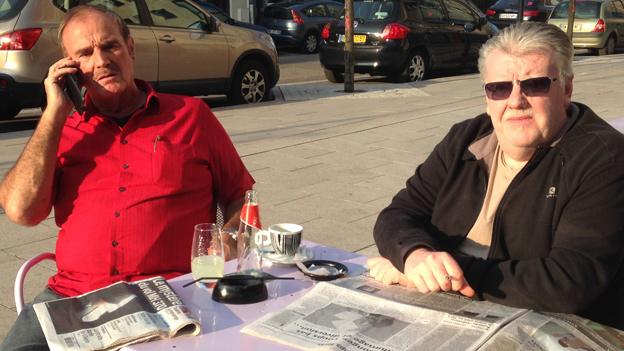Polishing the image of France's National Front
- Published

France's far-right National Front party has made significant gains in local elections. In the eastern town of Forbach, exit polls put the party's deputy leader ahead in the race for mayor. Emma Jane Kirby assessed the mood there before voters went to the polls.
The young men are smashing a bin, plastic shards splintering over the pavement as they kick and jump on it, hurling obscenities.
When it's completely flattened they retreat, panting and laughing, but one North African teenager, seemingly driven by an atavistic fury, continues to pound the fragments, screaming: "I break everything. You hear me? I'm gonna break everything in this dump."
There's a lot in Forbach that's already broken.
Unemployment here is close to 15% and almost a third of young people are jobless.
The average salary is just £14,500 (16,717 euros) and the lack of spending power is evident - in the town centre, scores of shop fronts are boarded up.
I take a tour around the town with an elderly, erudite local historian Jean Claude Flauss who shows me the painful reminders of Forbach's better times - the remains of a massive cardboard factory, now flattened into a car park; coal mines, idle since 2005; and in the suburbs the miners' former accommodation blocks, now largely populated by refugees and immigrants for whom the town can offer no work.
Police sirens wail continuously - predictable theme music, says Flauss, for a town that's been left to rot.
He smiles at me sadly through his big, round glasses and asks if I'm really surprised this is fertile ground for the National Front (FN).
In Forbach's market place, wearing jeans and a blue suit jacket, Florian Philippot, the FN's deputy leader and candidate for the mayoral elections, gives a laid-back but respectable impression as he chats to locals and hands out pamphlets.
As the party's spin-doctor, he's spent a long time purging it of its thuggish, anti-Semitic, racist image and replacing it with something far more nebulous.
He was educated at Paris's elite universities - the same establishments attended by the French President, Francois Hollande - and when I ask him what somebody who is so clearly part of the system is doing in a far-right party that prides itself on being anti-establishment, he winces.
"My education has made me acceptable to many voters who would normally never vote for the National Front," he says coolly.
"But my parents were primary school teachers so I am not from the privileged class - I understand what being hard-up means," he adds.
He leans forward in his chair. "And I don't like to be called 'far-right'," he corrects me firmly, "I am a Gaullist."
I ask him how a party which has talked about closing the borders can hope to succeed in a town which is a stone's throw from the German frontier and has a huge immigrant population.
He flings open the window in his office.
"This is wide open," he says patiently as if teaching a child.
"And this," he adds, putting the catch on the first notch, "is partially open. Our maxim is Manage the Borders, not close them."

Subtle tweaks to the rhetoric, a shifting of emphasis, a misting of meaning, a blurring of ideologies.
I think of one of Francois Mitterrand's favourite quotes, from a 17th Century cardinal: "If you set aside ambiguity, it's always to your own detriment."
In a pavement cafe, Marcel and Pascal grumble together over the local paper.
Pascal, now in his mid-50s, was a miner and union leader who fought bitterly against the pit closures.
He jabs his finger at a picture of President Hollande and mutters that neither the Socialists nor the conservative UMP party have a clue what it's like to struggle.
Marcel looks up from the sports results and says he met Philippot at lunch-time in the market. I wait for Pascal, the former communist trade unionist, to spit blood.
"I'm thinking about voting for him," he says quietly.

Marcel and Pascal are considering vote for the National Front for the first time
Catching my astonished glance he snaps: "Oh just look around you - this town is dying - what have mainstream politicians done for us? We've had enough!"
My historian, Flauss, tells me there used to be 40 nationalities in Forbach when the pits were operating in the 1960s and there were never any problems with racism.
"You know this is a place with such a great past. But the way it's being run, it has no future," he says.
He pauses: "We need a shock and a shake-up here. So for the first time in my life, I'm probably going to vote National Front."
In the market place, Philippot is sharing a joke with an Arab man who's selling cheap, plastic bracelets.
As they shake hands the man tells the National Front candidate he recognises a fellow hard worker and assures him he has his vote.
A far-right political group which was once called a fringe party, is now creeping as softly as the springtime sun, into the mainstream.
At the fruit and vegetables stall, an old woman beckons me over: "There's a French expression," she says "Quand c'est flou, c'est qu'il y a un loup."
When it looks a little hazy, beware the wolf out there.
How to listen to From Our Own Correspondent, external:
BBC Radio 4: Saturdays at 11:30 and some Thursdays at 11:00
Listen online or download the podcast.
BBC World Service: Short editions Monday-Friday - see World Service programme schedule.
Follow @BBCNewsMagazine, external on Twitter and on Facebook, external